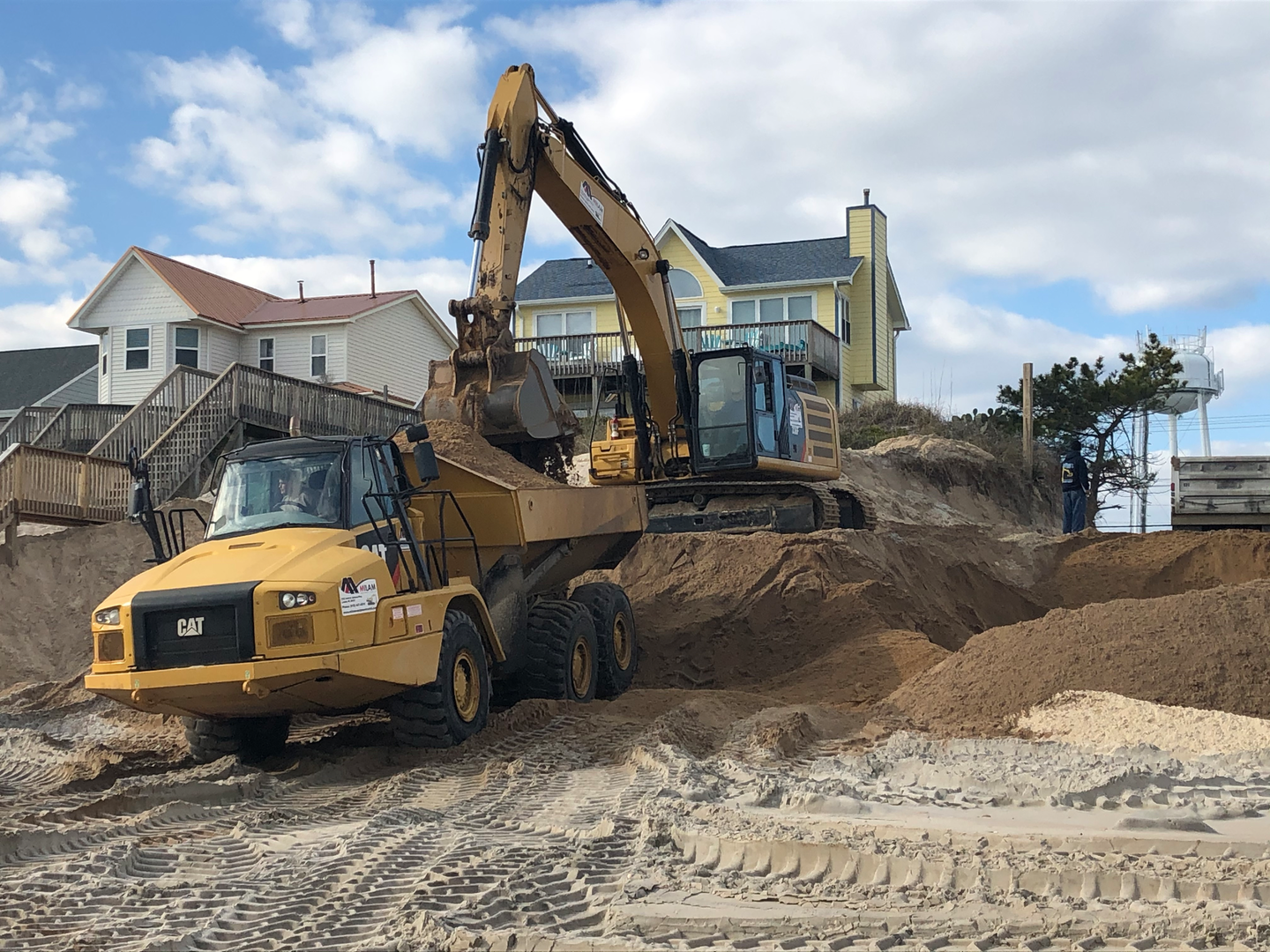Two things you quickly learn about Matt Mitchell is that he loves Sneads Ferry, North Carolina, where he has lived all his life.
And he loves dirt.
“A grown man might be a grown man, but somewhere deep down he’s still got a little boy in him,” he says. “And they all like to play with little toys and dirt.”
“I love the challenges,” he adds, when explaining why he loves being a contractor. “I really like doing the things they say you can’t do, or can’t be done.”
That attitude has led his business, C.M. Mitchell Construction Company, to grow to more than 50 employees, 35 pieces of equipment and annual revenues of $10 million to $13 million. For that and more, Matt is one of Equipment World‘s 2020 Contractor of the Year Award finalists.
Hard lessons
Matt learned about hard work, honesty and integrity from his father, a retired Marine who had been stationed at nearby Camp Lejeune. His father and mother ran a little country store and tackle shop on Vultures Landing.
“Son, your word is all you’ve got,” his dad would tell him.
He helped instill a strong work ethic in Matt.
“As a Marine, he taught us how to work, and he taught us what our backs are made for,” Matt recalls. “When I was growing up, it was all back-breaking work. He wasn’t taking any shortcuts.”
They would also dig the graves for local residents who passed away. It was a free service his father started, and Mitchell Construction continues it to this day.
As a teen, Matt worked for a family friend who owned a construction company. Matt would run a dozer and excavator and drive a dump truck. He worked for him for about 10 years. Then the owner had a heart attack and sold the business.
Matt bought a commercial fishing boat, but that new career lasted only about 10 weeks. “I was there one day fishing, and I just said, ‘I’m done with this. I’m going back in the dirt business. I’m going to do it myself.’”
That was in 1994. He used the money from selling the boat to buy a farm tractor and a trailer. His parents co-signed for a $25,000 loan. Matt used that money to buy a 1974 dump truck, a backhoe and a dozer.
His brother Mel drove the dump truck, and Matt moved dirt. They cleared lots, put in driveway culverts, whatever people needed done.
He did a lot of subcontracting work and landed his first big job at Camp Lejeune. During that job, he met Theresa who was working for the general contractor on the project. She helped him with the paperwork, and he told her if she ever decided to leave her job, he wanted her to come work for him.
“I don’t think you can afford me,” she told him.
But in time he won her over, and they’ve been keeping C.M. Mitchell growing ever since.
With her as chief financial officer and Matt running the construction business, they’ve landed many multimillion dollar projects over the years.
Landing big jobs
The company won its first job over $1 million by traveling to Virginia to meet with a large construction firm. The company was planning a complicated project involving a 100-square-foot amphibious boat ramp at Camp Lejuene. Matt convinced them he could handle the work.
“We were so excited,” recalls Theresa. “We had a $2 million job.”
With Matt running the construction operations and Theresa running the office, the couple have built a successful construction firm in Sneads Ferry, N.C.Equipment WorldThey began hiring more employees. Along with the boat ramp, the project involved building docks, ponds and a parking lot, as well as installing sewer and drainage lines.
The work was going well, but the finances ran into trouble. Mitchell wasn’t getting paid by the contractor on the project, and the company needed the money to pay off the project’s financing.
The contractor eventually paid the $800,000 he owed Mitchell. But the stress of trying to collect it had left Matt and Theresa rethinking their business. “One minute you’re up there, and the next minute you could lose your home if somebody doesn’t pay you,” says Theresa. The couple were also raising their three sons at the time.
After another episode in which they had to take a contractor to court to get paid, they decided to reorganize and trim down. “We’re going to stop going after the big work,” she says. “Let’s gain control of what we’re doing.”
They became more cautious about the contractors they subbed for. They landed work with large contractors, which brought them multiple projects. And they paid on time.
“We were able to pick and choose who we worked for,” Theresa says. “We could do some background on them and make sure that the people we were trying to be a subcontractor for were of good character.”
Then the September 11 terrorist attacks caused the local construction economy to tank. Mitchell was able make it through with projects on military bases. Government projects also got them through the Great Recession.
In 2011, the company had grown to 40 or so employees. And Matt decided to scale back to about 25 workers. He started turning some of his attention toward other ventures. He opened a restaurant and a boat store. He bought two shrimp boats. He bought and renovated boats and sold them. Then he spent about five years building his own boat – all while still running his construction firm.
“I don’t know why this was going on,” says Theresa. She calls it his “nostalgia tour.”
Matt just laughs.
“But one thing about my husband,” she adds. “He has no hobbies. Everything he does has to generate revenue.”
Ramping back up
Meanwhile, the construction firm was doing well, holding steady. And eventually, many of the side ventures drifted away.
“Our real passion that really drives us is here,” Theresa says, referring to Mitchell Construction.
 Dump trucks haul in sand and an excavator fills dump trucks on the beach to rebuild dunes in North Carolina eroded by Hurricane Florence.Equipment WorldTwo of their sons love construction work, and the couple want the company to be available for them.
Dump trucks haul in sand and an excavator fills dump trucks on the beach to rebuild dunes in North Carolina eroded by Hurricane Florence.Equipment WorldTwo of their sons love construction work, and the couple want the company to be available for them.
The company has grown back to 50 employees. It updated its accounting software, switched to project management software and began using iPads on jobsites. They also increased pay and benefits to attract and keep good employees.
Along with the changes, the company has continued to benefit from Matt’s work ethic and quality standards.
“A lot of people really respect Matt,” Theresa says. “A lot of his employees respect him because he’s the type of guy who is out there in the ditch with them.”
The company also maintains a family atmosphere. Theresa cooks lunch each day at the office for employees. A number of the employees are actual family members.
Their oldest son, Mark, has worked with them since 2000 and recently branched out on his own to start a concrete business. Their youngest son, Matthew, is the company’s asphalt division supervisor. Matt’s two brothers and Theresa’s sisters also work for the company.
“We’ve always been a real tightknit family,” Matt says.
Moving dirt
One of Mitchell’s latest projects has been rebuilding the sand dunes on Surf City and North Topsail beaches, which had eroded during Hurricane Florence.
The projects involved hauling in and placing more than 200,000 cubic yards of sand. Mitchell dump trucks came and went hauling sand from miles away, while excavators and dozers moved like clockwork to build the dunes.
“I can move dirt, and I love moving dirt,” Matt says.
Surf City Town Clerk Stephanie Hobbs agrees.
“They’re a great company,” she says. “I would give them the highest rating you have. They show up in a timely manner and get the job done on time and on budget.”
Matt attributes his success to hard work and recommends the same for new contractors.
“You’ve got to work hard. You’ve got to put your time in,” he says. “When everybody else is off having fun, you’ve got to go make a deal with somebody.”
 C.M. Mitchell Construction dozers rebuild dunes damaged by Hurricane Florence.Equipment World
C.M. Mitchell Construction dozers rebuild dunes damaged by Hurricane Florence.Equipment World



Responses